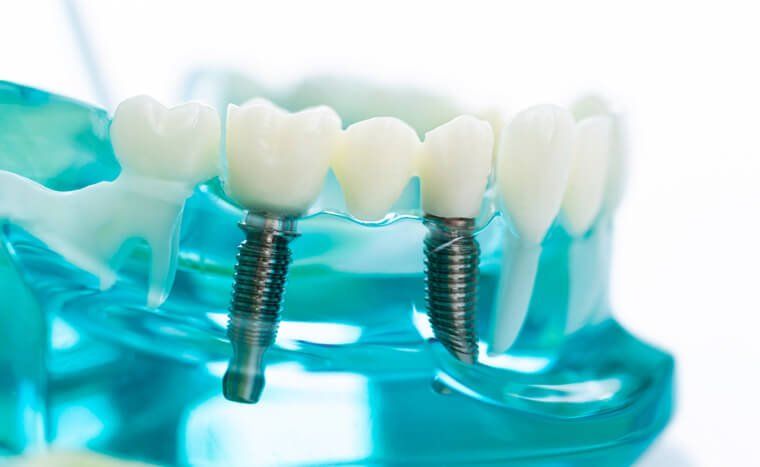(843) 216-0908
Is It Better to Get a Dental Bridge or Dental implants?
Dental Bridges and dentures used to be the only solutions to replace missing teeth. A bridge requires the use of the teeth on either side of the empty socket to support the new tooth and prevent other teeth from shifting. The procedure provides a more permanent solution than a partial denture. However, you must have healthy teeth and gums to qualify because the process requires the dentist to use the adjoining teeth to support the bridge.
Risks of a bridge include potential tooth decay in the adjoining teeth and infections. A bridge has lower upfront costs than a dental implant but only lasts between 5 and 15 years, depending on how you care for your teeth. It is possible to repair or replace a bridge if adjacent teeth remain healthy and the underlying bone structure remains sound.
Dental implants use the most modern technology to address missing teeth and provide a permanent solution that never needs replacing or repair. The implant process can replace a single tooth without altering any surrounding teeth making it the healthiest and longest-lasting tooth replacement option available. The process results in natural-looking teeth that look and function like your remaining natural teeth. A dentist can replace one or all your teeth through the placement of dental implants.
What Are Dental Implants?
A dental implant is a permanent titanium post that is inserted through the gums and into the underlying bone. Over time, the implant permanently and securely grafts to your jawbone. The dentist then secures a crown in place of your tooth on top of the implant post, creating the look and feel of your natural teeth. Dental implants allow you to eat, drink, and speak without anyone knowing you have artificial teeth.

How Much do Dental Implants Cost?
While dental implants have a higher upfront cost, they are a permanent solution to tooth loss, which can reduce long-term expenses because the new teeth do not need repair or replacement under normal circumstances.
Benefits of Dental Implants
While dental implants replace missing teeth, creating a fuller and more beautiful smile, they also help to preserve healthy bone structure and stimulate the growth of the underlying jawbone. This helps to preserve the overall esthetic facial structure and prevent further bone deterioration, providing better oral health and function.
FAQs
- What is the alternative to dental implants?
Dental implants are one of the most popular options for replacing one or more missing teeth. In addition to implants, full or partial, fixed or removable bridges are a common treatment used to replace missing teeth between adjacent healthy teeth.
- Do dental implants shorten your life?
Dental implants don’t shorten your life and can actually help you live a longer, more healthy life by improving your dental function and allowing you to eat a diverse selection of foods in cluding healthy fruits and vegeatables and foods high in protein.
- Who is not a good candidate for dental implants?
Patients who grind their teeth, clinch their jaw or bite their fingernails may put too much pressure on the implants which could result in long-term damage. Also, people with certain medical conditions like uncontrolled diabetes, a severely compromised immune system, or people that that steroids or other drugs to suppress the immune system may not be a suitable candidate for dental implants.
- What is the best age for dental implants?
Dental implants are an appropriate, permanent solution to missing that can last 25 years or more with proper care and maintenance. Since over half of individuals over the age of 65 have at least one missing tooth, dental implants are a popular solutions for older individuals wanting to replace one or more missing teeth, or replace a full arch of teeth with implant supported dentures.
- How long do teeth implants last?
A typical dental implant will easily last 25 years or more with good dental hygiene and proper care and maintenance. Maintaining dental implants is no different than caring for your natural teeth and require twice daily oral care and good hygiene practices. Failure to properly care for and maintain your dental implants can greatly shorten the expected life of your implants.
The post Is It Better to Get a Dental Bridge or Dental implants? appeared first on Smiles by Hogan.
CONTACT
Information
Phone: (843) 216-0908
Address: 3405 Salterbeck St. STE 100
Mt. Pleasant, SC 29466
Email: office@smilesbyhogan.com
BUSINESS
Hours
- Monday
- -
- Tuesday
- -
- Wed - Thu
- -
- Friday
- -
- Sat - Sun
- Closed
















